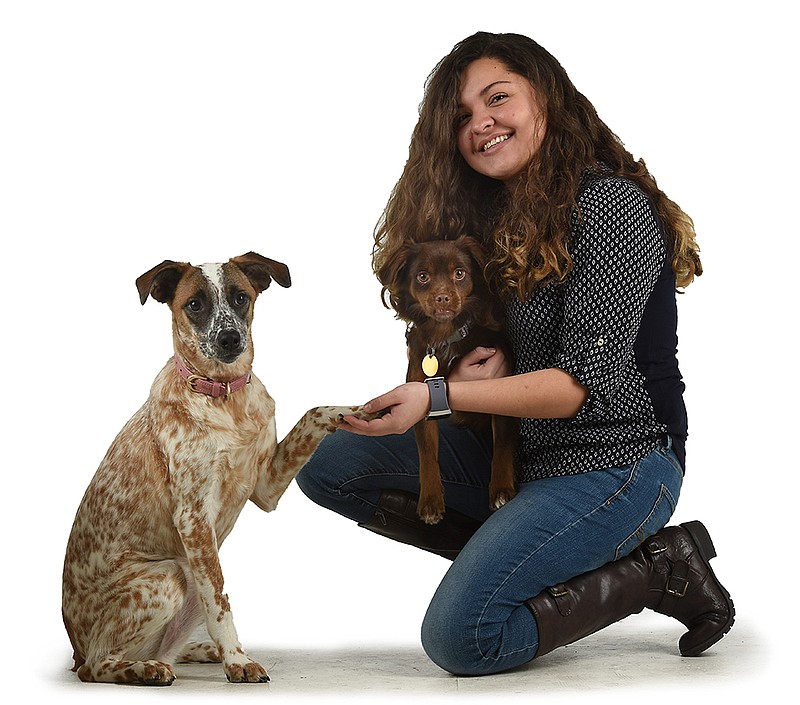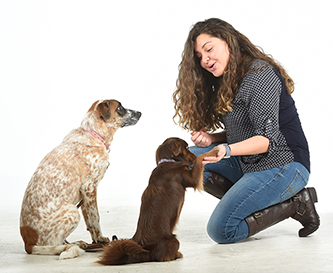Name: Silvana de Jesus
Age: 25
Occupation: Certified dog trainer and behaviorist
Hometown: Sarasota, Florida
You say "sit." Your dog wanders the opposite way. You beg her to keep still. She leaps at visitors anyway.
It's no secret that man's best friend can sometimes be his biggest headache, warranting a desperate call to an obedience trainer (or two). But with lessons merely covering basic commands and tricks, traditional training methods often provide little more than a Band-Aid for deeper behavioral issues, says Silvana de Jesus.
As the owner of Little Monsters, a local dog care and training service, de Jesus has helped dozens of pet parents at wit's end eliminate recurring problems for good by giving them a sneak peek into their fur babies' minds. Using dog psychology, pack mentality and body language, de Jesus teaches clients how to decipher their dogs' behavior so they can understand why their pup is acting a certain way and rectify the issue on their own.
The mission has been one close to her heart since she embarked on her own journey to understand her troubled fur baby, Bailey, two years ago.
» [Bailey] came from an abusive home. She had cigarette burns down her tail, her legs. She was so fear-aggressive, she ended up biting me three times.
» The third time I had to go to the hospital. [My husband] Andrew had to take her and rip her off my arm. And he told me, "That's it. We're putting her down. We can't do this anymore." And I was like, "No, please! Let me find a way! I can save her!"
» We spent close to $2,000 trying to find a trainer for her. One of them we paid $600 for one session with him, and he told us to bark at her. And I was like, "This is ridiculous." [laughs] So that's when I started getting into the whole [training] thing.
» I started off learning from two trainers. One was this amazing dog trainer from New Zealand and I ended up taking a yearlong course from him. He teaches what you need to do in your own personal lifestyle to become the pack leader so the dogs choose to follow you.
» Dogs are always looking for a leader. Often, you have very fearful dogs that would be the last choice out in nature to be the pack leader, but because we as humans don't know how to be the pack leader, they step up in that role, and you get very anxious, very nervous dogs. And that was Bailey.
» As soon as I learned what I needed to do to become the pack leader, her anxieties went down, because now she had somebody to look up to and to lead her and guide her. She didn't have to be afraid anymore.» Before, at nighttime, you would look at Bailey and she would show you her teeth and she would growl. Now, I can lie down on top of her and do whatever. My mom, who was scared of Bailey, ended up asking me if she could take her as an emotional support dog. That's how drastically she changed.
» People don't understand [their dogs] because they don't understand dog psychology. A lot of times, we think because we see them as our fur babies that we can just apply human psychology. But that's like trying to train a fish and a monkey to do the same thing, then asking, "Why isn't it working?"
» Let's say your child gets in trouble and you're upset with your child. You say, "First-name Middle-name Last-name, get over here!" Right? Well, with dogs you can't do that.
» Dogs don't understand the concept of a name. For them, a name is synonymous, in a way, with the word "come." For example, [my dog] Chloe, say she runs away and I'm like, "Chloe! Get back here!" When she comes back, I put her into timeout or something. Then she starts to associate "Chloe" as a negative thing and so she doesn't want to come back always.
» With dogs, I use the sound "tssht!" [instead]. They don't like that. That noise bothers them. So when they're going to misbehave or do something that I don't like, I'll go "tssht!" and it grabs their attention. We try to use names only for praises.
» I work with the dogs, but I do even more owner education and working with people.
» A big part of what I do deals with your energy, and I'm not talking about your chakra. I'm talking more about your emotions; when you get really hyper, really anxious, really angry, stuff like that. We look a lot at calming that down, because the dogs will mimic that.
» For example, when people say, "My dog is so hyper, my dog is anxious," then we look at that in you.
» We do about an hour of relaxation and stretching [with the owner]. Then they notice as they're starting to relax that the dog is also [starting to relax]. Then they're lying down sleeping on the floor and the owners are like, "This has never happened before!" It's because they're mirroring you.
» So it's a little bit of a lifestyle change for the owners. They have to be willing to commit to these changes. Because if not, it's not going to work. And I'm not always gonna be there living in their home saying, "Remember to do this and do that."
» If you're looking, let's say to present your dog at a show, I don't offer that. My type of obedience training is more "I want my dog to listen, and that's it. I don't want it to look like a show dog, I just want my dog to listen to me."

